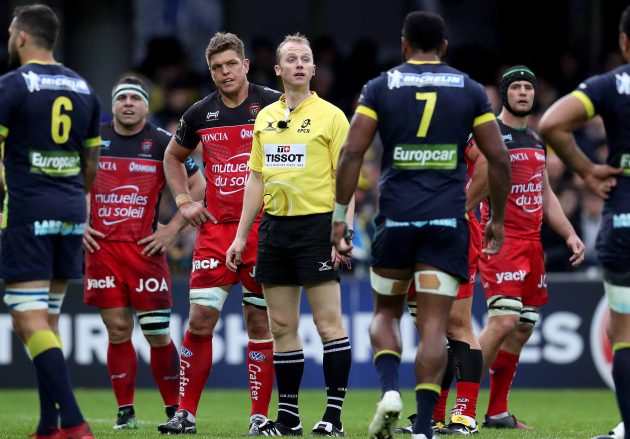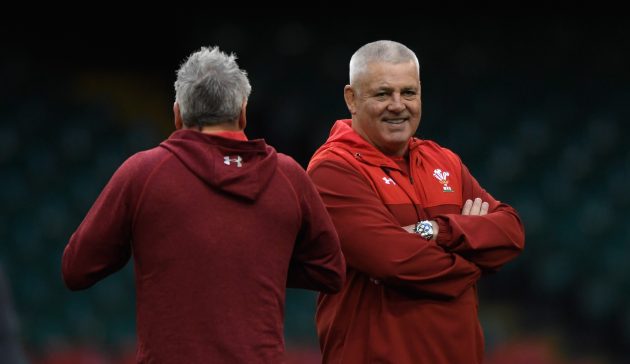Gatland's grenades are back, the tough life of a referee, inter-nation training, long-term earnings and the RFU's controversial plea are all covered
Referees need less to do
The modern referees’ job has become a laughably difficult task. Rugby has essentially become a game of five separate functions with open play, the ruck, the maul, the scrum and the lineout becoming such unique disciplines that they hardly resemble the same elements that existed during the amateur era. The ruck and scrum have become some so tiresome in their interpretation that they almost qualify as separate sports within a sport – and thus now require a different approach to refereeing. It is unfair to expect the referee to oversee the whole operation.

The impossible job: The game is now so complex that more help is needed for referees
For example, it has become impossible for an individual to focus on the ruck and the offside line at the same time. Literally impossible. Short of embarking on a genetic breeding programme where we create four-eyed whistle blowers, asking a ref to look at two things simultaneously simply can’t be achieved. Offside decisions would be the sole responsibility of the assistant referees. And time keeping should be the sole responsibility of the TMO – why the referee is still in charge of the timing is bizarre, when the TMO can easily see when the game requires starting and stopping without the input of the referee. Rugby has undergone many changes since it turned professional, in particular with player roles becoming more specialised, and it is now time that the referee’s role underwent a similar evolution for their sake as much as the game’s.
Gatland goes on a crash diet
October was a lively month for Warren Gatland, even by his standards. He came out firing like a long lost member of NWA. First, he turned his pistol around gangsta style and took aim at the Kiwi press for trolling him during the British and Irish Lions’ tour, reloaded and took a shot at Sean O’Brien, then started blasting shells at Welsh supporters by stating that he had probably stayed in Wales too long and that a loyalty bonus was playing a big role in keeping him as head coach. But by far the most interesting aspect of Gatland’s October was his new Welsh squad. Particularly his selections at centre.

Righting some wrongs: Warren Gatland has been outspoken on a variety of topics
Gone were the crash ball centres of yesteryear and in came the ballers – Owen Watkin, Owen Williams and Hadleigh Parkes all represent very different options for Wales. What’s more intriguing is that Gatland didn’t even give himself the option of Jamie Roberts should the new passing plan go awry. It was like a well-upholstered lad going on a diet and not being able to have chocolate anywhere in the house. It would be all too easy for Gatland to have a craving late one night during the autumn internationals and go foraging into the cupboard for a lump of Jamie. If last month has been anything to go by, Gatland’s run in to the World Cup is going to be as wonderfully unpredictable as Steff Evans’ feet.
England v Wales scrummaging and lineouts – let’s take it further
The revelation that Wales and England will take part in an organised session of scrums and line-outs represents a positive progression for rugby union and a degree of creative thinking on which the game should capitalise. It feels like a very NFL thing to do and the benefits extend beyond the coaching sphere. These new ‘mini games’ would provide an ideal opportunity for livestreaming and possibly another income stream. An income stream which makes far more sense than extending the season.

Full bore: The England v Wales training session should be a lively affair
Instead of making the players play more, why can’t we simply make more use of the things that players are already doing – such as training. The streaming of these events would also allow for some more in-depth analysis of the modern scrum and lineout – something which is difficult to achieve during the complicated dynamics of an 80-minute game.
Test caps provide a long-term income
No-one can blame Rhys Webb for choosing to join Toulon next season. It is a once in a career opportunity to play with one of the best club teams in the world, with a collection of the finest talent, whilst earning a salary that we’re all envious of. However, Webb’s planned move abroad and the subsequent 60 Cap limit, or CAPS LOCK, imposed by the Welsh Rugby Union has poised a very interesting question for players and agents. Whilst the short-term gain of a few seasons in the Top 14 are obviously lucrative, the threat of not accumulating test caps has its risks long-term. Rugby, as yet, is not a profession that allows its retiring players to put their feet up.

Tough call: The new 60-cap rule could make a huge dent in Rhys Webb’s future earnings
Unlike football, where its elite players need not lift a finger after their playing days end, rugby’s wages do not offer that privilege. Even the current crop of big earners will still need an income after they retire; something in which test caps play a big role. You only need look at the lucrative after dinner circuit to see where the number of test caps literally translates into cash. British and Irish Lions and test cap centurions command significantly larger fees. A quick glance at the media landscape evidences where the big TV contracts and book deals land – 30 cap players don’t have nearly as much pulling power as 100 cap legends and they certainly don’t open as many supermarkets. Short term cash will always be a big draw for rugby players, particularly those with young families, but the long-term prospects must also be taken into account; and that is where test caps are worth their weight in platinum.
The RFU demand help to protect their academy players
One can only imagine how much coffee was spat on various union blazers as news spread around the world that the RFU was seeking help from World Rugby to prevent their players being poached. It was a statement that even Sean Spicer would have thought twice about issuing.

A bit rich: The RFU going to World Rugby to stop other unions pinching their players received little sympathy
You don’t even need to pour through the inventory of young Welsh players at various private English colleges to understand the lunacy of the statement – just look at the current senior England squad and you’ll see players who’s ‘junior investment’ took place in another country. This isn’t to say that other unions don’t do the same, of course they do. However, when you’re the head poacher, at the Poacher’s Convention, celebrating 20 years of poaching, it’s probably not wise to play the poachers card.





